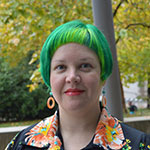With nearly a third of Canadians experiencing mental illness during their lifetimes, researchers and urban planners have been looking at ways to incorporate natural spaces that promote mental wellbeing into designs for healthier cities.

Emily Rugel
Emily Rugel, a PhD candidate at the UBC school of population and public health has been studying the link between access to natural spaces and mental health. In a recently published study, Emily created a Natural Space Index to more precisely measure exposure to nature across Metro Vancouver.
Why did you develop this Natural Space Index?
Research has shown that natural spaces can provide psychological benefits to individuals, but when you move into population-level studies, the associations between the two become less clear.
The benefits we get from natural spaces can’t be linked simply to the presence of a public park, the number of street trees or how far you live from the coast. Even things like simply observing nature from a window can have distinct health benefits.
Right now, the tools we use to measure exposure to nature are fairly limited in scope. Our Natural Space Index is more robust and seeks to improve upon current tools.
You used the index to evaluate parks in Metro Vancouver. What did you find?
I evaluated a sample of 200 parks in both low- and high-income areas, from Vancouver to Lions Bay and Abbotsford. Hearteningly, I found that there was no significant difference in park quality between low and high income neighbourhoods, but park quality was fairly low on average: 15 on a scale of zero to 45.
What factors contribute to the index score?
The index combines four different areas: presence, form, accessibility and quality. These were measured using a range of tools such as satellite imagery, public and private databases, and quality appraisals.
Our findings suggest that even small spots like traffic circle gardens may offer some of the same health benefits as larger areas, showing the importance of measuring a variety of natural spaces.
I also accounted for areas with restrictions such as fees or permits. Take golf courses for example: could views be calming or beneficial even if access is limited?
Finally, I measured quality using the Public Open Space Desktop Appraisal Tool. This tool evaluates things like whether a park supports activities like soccer or tennis, environmental quality based on features like tree counts or a waterfront location, safety concerns, dog regulations, and the availability of amenities such as picnic tables and public art.
What are the next steps?
I’m currently applying the index to data from a population-level health survey and will look at the relationship between exposure to natural spaces and drug prescriptions to better understand the population-level health benefits.
I also plan to place the index and appraisal tool online so residents of the region can evaluate natural spaces around them and find ways to improve nearby parks.